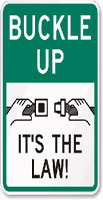Once upon a time, the auto industry ruled the polluting roost. Not unlike the energy companies today, when automakers were required to clean up their act, they thought there was too much to lose.
Going Forward Once upon a time, we had no seat belts in our cars. I remember my mother sitting in the backseat of our station wagon with my brother and I to "protect" us. Every time my dad slammed his foot on the brakes, she would flay her arms out to keep us from hitting the back of the front seats. When it was scientifically proven that restraining passengers saved lives, we were buckled tightly into shiny seat belts. Then my mom resumed her rightful place in the front seat. Each year, car restraint systems were checked, tweaked and upgraded for safety. As safety studies mounted, more protective measures were instituted. What was non-existent when I was a kid, we now take for granted: airbags, advanced braking systems, safety glass, firewalls and child car seats.
Once upon a time, when the the tank was filled with gas, the air filled with lethal vapors. Cars ran on leaded gasoline. There were no pollution standards regulating emissions of carbon monoxide and hydrocarbons until 1970 when the Clean Air Act was passed. One of its first order of business was a 90% reduction in emissions from new automobiles by 1975 (the year I got my first car). Congress also established the EPA, giving it broad responsibility for regulating motor vehicle pollution.
Going Backwards Once upon a time, when these safety issues were addressed by the Clean Air Act, the auto industry made a big stink warning us that forcing them to implement safety measures would result in catastrophic manufacturing and financial hardships. They insisted that implementing emissions restrictions would be totally unsustainable. While automakers still balk, they continue to keep in step with the Clean Air Act. With high demands for increased fuel-efficiency cars, would we even consider going backwards?
Going Forwards Once upon a time, the EPA proposed establishing limits on power plant emissions of mercury, arsenic and other hazardous pollutants. In hopes of continuing to protect our families and lessening the effects of climate change, we're advocating for tighter laws for facilities that release toxics into the environment.
Going Backwards Once upon a time, the coal, oil and natural gas industries enjoyed the protection of a political climate that exempted them from safety regulations that would protect our children. Instead of accepting such safety measures like their bi-partisan predecessors who helped pass the Clean Air Act, putting politics over science, these politicians support striking down the Clean Air Act in favor of industries that pollute. What would happen if the auto industry pressured politicians to remove regulations for no seat belts in cars? Would we let that happen?
Going Forwards Once upon a time, the development and deployment of clean energy sources like wind, solar and geothermal energy were the viable solutions. They still are. Take action and help educate policymakers and the public about renewable energy solutions.
Going Backwards? Once upon a time, we did not know what was lurking in the air we breathed. We do now - and we've got the science to prove it. It just stinks that our children may be heading into a future without the equivalent of seat belts.


